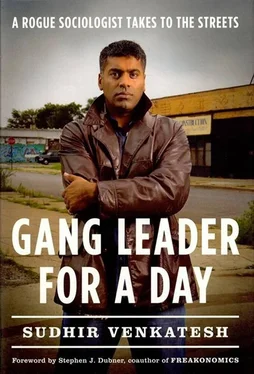“And you think the CHA will actually agree to these demands?”
Ms. Bailey just sat and stared at me. Apparently my naïveté was showing once more.
I tried again. “You already got them to agree, didn’t you?”
Again she was silent.
“Is that what this meeting is about?” I motioned toward the outer room where the other building presidents were waiting. “Is that why this guy from the CHA is coming?”
“Well, no,” she said. “We already had that conversation. Today is about the families. Let me tell you how this process is going to go. I know it’s early, but they’re already tearing down the projects on the West Side, so there ain’t no mystery anymore.” The Henry Horner projects on the West Side were being razed to make way for a new sports arena, the United Center, which would host the Chicago Bulls, the Chicago Blackhawks, and, eventually, the 1996 Democratic National Convention. “We’ll make our list, and they’ll take care of our people.”
“Your list?”
“I already told you the CHA has no money, Sudhir! What part of this don’t you understand?” She grew very animated and then suddenly quieted down. “They can’t help everyone. And you know what? They’ll mess up like they messed up in the past. Not everyone is going to be taken care of.”
Ms. Bailey said that she would likely be able to help only about one-fourth of the families move out safely. Her bigger job, she said, was to make sure that the remaining three-fourths grasped this reality. The CHA, she said, “plans to use most of their money to demolish the buildings, not help people move out.”
So Ms. Bailey and the other building presidents made lists of the families who they felt should have priority in obtaining rent vouchers, assistance in finding a new apartment, or free furniture and appliances. This list, it turned out, didn’t necessarily comprise the neediest families-but, rather, the building presidents’ personal friends or tenants who had paid them small bribes.
I asked Ms. Bailey how much she was getting.
“Sudhir, I’ll be honest with you,” she said, smiling. “We’ll be taken care of. But don’t forget to put in your little book that the CHA also gets their share. We’re all washing each other’s hands around here.”
It wasn’t very pleasant to watch this entire scenario play out in two parallel worlds. In the media all you heard were politicians’ promises to help CHA tenants forge a better life. On the ground, meanwhile, the lowest-ranking members of society got pushed even lower, thanks to a stingy and neglectful city agency and the constant hustling of the few people in a position to help. In the coming months, the place began to take on the feel of a refugee camp, with every person desperate to secure her own welfare, quite possibly at the expense of a neighbor.
Not everyone, however, was so selfish or fatalistic. For some tenants demolition represented a chance to start fresh with a better apartment in a safer neighborhood. It was particularly inspiring to watch such tenants work together toward this goal while their elected leaders mainly looked out for themselves.
One such optimist was Dorothy Battie, a forty-five-year-old mother of six who had spent nearly her entire life in the projects. Dorothy lived in a building a few blocks away from J.T. She was a heavyset woman, deeply religious, who always had a positive demeanor despite having suffered through everything the projects had to offer. Her father and several nieces and nephews had been killed in various gang shootings. Dorothy had fought through her own drug addiction, then helped other addicts enter rehab. Some of her children were now in college, and one was a leader in a Black Kings gang.
Dorothy had never been an elected tenant leader, but she was a self-appointed godmother to countless families. She helped squatters find shelter, fed tenants who couldn’t afford to eat, and provided day care for many children, some related by blood and others not. Spurred on now by the demolition, she began to act as a sort of relocation counselor for several families who were determined to live near one another in a new neighborhood. They thought that sticking together was their best, and maybe only, chance for survival. These families became informally known as “the Stay-Together Gang,” and their undisputed ringleader was Dorothy.
I caught up with her one day in her living room as she was looking over a list of the families she most wanted to help.
“Let’s see,” she said, “I got Cherry, three kids. Candy, two kids. Marna, a son and a daughter. Princess, three kids. Carrie, two young girls. And there’s probably a few more.” All these young women were friends who shared baby-sitting, cars, and cooking. Now their mission, with Dorothy’s help, was to find a place to live where they could keep their network intact.
“See, here’s the problem,” Dorothy explained. “I know what it’s like out there in the private market. You end up in some apartment, with no one around, no one to help you. And you’re scared. At least if a few people can move with each other, stay together, they can help each other. Lot of people out there don’t like us because we come from the projects. They may not answer the door if we knock for help. So I want to make sure people don’t get stuck in the cold.”
It was important, she said, to start with the most stable family in the network. That was Cherry, who worked thirty hours a week as a fast-food cashier and also went to night school. Dorothy’s plan called for Cherry to find an apartment in a good neighborhood and then bring the other families over.
While this plan seemed pretty straightforward, Dorothy told me that success was hardly guaranteed. “Things never go as planned,” she said bluntly, “because we’re dealing with poor people.”
Dorothy’s first obstacle was Ms. Reemes, a powerful tenant in her building, who was not elected to any office but had great influence with the CHA and police. Like Ms. Bailey, Ms. Reemes expected families to pay her a fee, anywhere from fifty to two hundred dollars, for smoothing the relocation process. Every family that Dorothy helped meant one less potential bribe for Ms. Reemes. Although the building hadn’t even been singled out yet for demolition, Ms. Reemes was already accepting “deposits” from families who wanted a rent voucher or relocation services.
“She wanted me to give her a cut,” Dorothy said, “and I told her I’m not even getting paid to help these people! So I told her to go to hell. That lady is so selfish.”
As Dorothy told it, Ms. Reemes was so miffed by Dorothy’s refusal to play the payoff game that she went on a harassment campaign. First, Dorothy said, Ms. Reemes put in a bad word about Dorothy with the CHA. Within a week Dorothy’s two grown daughters, both of whom lived in the same building, received eviction notices for late payment of rent. This was particularly surprising, since one of her daughters had no income and was therefore excused from paying any rent at all. Dorothy successfully got the eviction notices rescinded. Then a CHA janitor cut off the electricity in Dorothy’s apartment, but Dorothy paid a squatter to restore it. Ms. Reemes then tried to get the gangs to harass Dorothy, not realizing that Dorothy’s own son was a senior gang leader. He paid Ms. Reemes a personal visit, and she backed down.
Through a classified ad in the Chicago Sun-Times, Dorothy found a two-bedroom apartment for Cherry’s family in Woodlawn, a poor but stable neighborhood about two miles away, near Hyde Park and the university. Because Dorothy had a CHA connection who helped Cherry get a $500-a-month housing voucher, she had to pay only $150 a month out of pocket.
Soon after Cherry moved in with her children and an aunt who would provide day care, Dorothy found a large apartment nearby for Princess and her three children. The only problem was that Princess’s brother and uncle heard about this and decided that they also wanted to move in. If they were found to be living there, Princess would lose her rent voucher on the grounds of illegal tenancy. Worse yet, her brother and uncle were drug dealers who wanted to use Princess’s apartment as a new base of operations. “Princess has put up with those two fools for too long, and it’s hurting her kids,” Dorothy told me. “I wanted her to start over, and now her brother and uncle are going to mess everything up.”
Читать дальше












